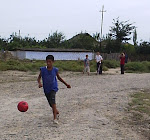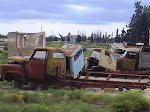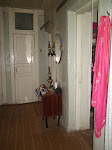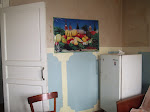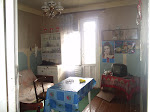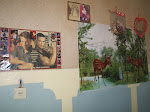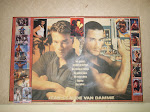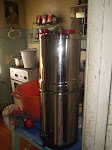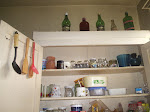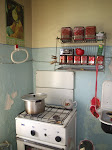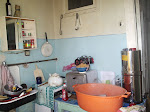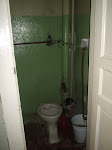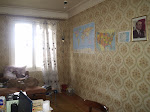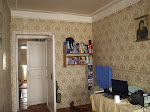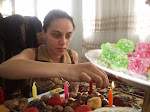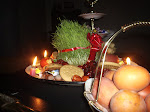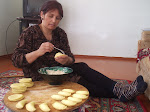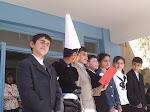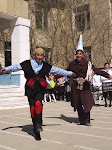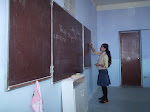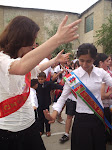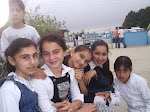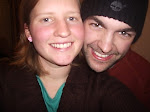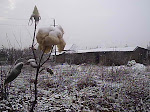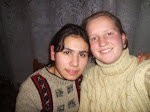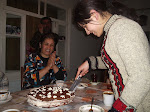I understand how her hands move in the steam, how she cuts the potatoes to boil and later mash, but just barely the words she speaks.
Muzaffar, on the other hand, who is trilingual, has his tiny paws wrapped around my ankle. He bites at my flip-flop. “Does Muzaffar want some piroshkies?” I hang my arms so he jumps to nibble at the tips of my fingers.
My host mother rolls her eyes and lures me to her cutting board. “Gal, Sasha, gal.” In the damp outdoor kitchen she demonstrates that with this knife she will cut and these onions to add the kartof that’s boiling here. My eyes burn from a distance. I assume that she will add at least a kilo of butter to the mix.
Lala scoots around the front of the house, faster than our puppy. She jogs upstairs to grab a potholder. Unlike my host mother in Sumgait Lala has fewer children, enabling her to grind beef, soak goose for a salty soup base, pickle eggplant, tomato, cucumber and green pepper, and knead and bake three to five loaves of wheat bread before the sun sets on the west side of the Kur. Then she hems pants. I don’t know for whom, but they’re all men’s pants, and it happens a lot.
She returns to slice three onions and slides them into the boiling grease on the gas stove. Using her wrist she brushes back her bangs to her gaudy gold and black patterned clip. They fall back to her almond eyes. I’ve never seen her thick strands flow to compliment her soft cheeks.
Back from the top kitchen, Lala calls. We are to roll out the hardening dough rising in the white vat. It reminds me of the playdough my mother would knead so she could read in her room, without three rugrats. Up top and bending down she pulled ingredients from the pantry: flour, water and a little bit of baking soda to hold the dough together. And they were magic, the tiny bottles of food coloring she handed us so we could dye our creation as well as our fingers.
I watch Lala as the dough sways in her hands, quickly yet elegantly into a sphere. My first try looks swollen and somehow discolored, like the roads that pave my village. Lala smears oil onto my palms so the dough will smooth out; it doesn’t, but Lala doesn’t mind. We make 60 medium- to large-sized balls.
Xanam, my host sister, is seated on her bed perpendicular to the stove. “My mother needs your help today. She is very busy. She must make piroshkies before five then prepare dinner. Then she must sew pants.” Over the sewing machine is draped trousers and white lining.
Lala bounces downstairs, and up again with the pot that has been drained. She hands me the potato masher, a kind that I’ve never used in the United States. I smash away. Sneaking a bite every few minutes, Lala turns for my opinion. “Yaxshi,” I nod. Dipping her index finger, she adds a dash of salt and tries it again. “Indi, yaxshi,” she says. Facing the kitchen garden, we set the mashed potatoes on the uneven, cracked, cool, open window.
The phone rings. “I’m here, outside, Sasha.” Emil has brought me the 1,674-page 2003 English-Azerbaijani dictionary, and the zero-degree sleeping bag my host mother views the same way as she does my headlamp. Strange things come from America.
On the crumbling brick patio I learn that Emil is fasting and is to take a 14-day vacation in a week.
“Is there any thing you would like me to clarify with your host mother before I leave?”
I begin, “I go in my room at night not because I don’t like her family but because it’s too much.”
“Bashadushmadum, bashadushmadum,” she laughs.
“Every day it’s Azerbaijani culture, Azerbaijani school, the language barrier, Azerbaijani teaching, Azerbaijani neighbors and food... In America,” I pause because I know very well where I am, “we have a lot of alone time. We just grew up this way. It’s how we regroup.” I use the palms of my hands to mold my head into the sphere it should be.
As my mother and I switch roles, as Emil expresses my concerns, her wispy bangs fall to her smile and she nods.
Emil lets himself out the back door, and my host mother and I climb the stairs to the kitchen above. Silence fills the room like smoke from burning dough.
She demonstrates how to flatten the dough and pull the sides into a petite oval shape. While I work on form she mixes the browned onions with the potatoes. The leaven is thick, three quarters of an inch, rising to the ceiling. We take turns flattening and stretching, spooning into the dough the cool potato filling. We fold one side over, rolling our thumb hard to lock the potato in. Like a wet cloth we fold it over again and flip it on its back. We do this 30 times instead of 60, since Emil is fasting. We lay them across the table in rows. In red they would look like juicy fruit rollups.
Near completion Lala moves soft strings of hair from above her brow. She lights the stove by match and fills the pan a quarter-inch thick with sunflower oil.
With tongs she places, one, two, three piroshkies onto the grill. “Sasha, gal.” She lets me take control, and warns me when the smoke melodramatically dances from the pan.
“Jeez, Bagishlayam.”
“Problem yoxdur!” she laughs.
I burn a few but the edible ones are heavy, like bread sticks, not like the grease-encrusted piroshkies fried by street vendors in Sumgait. With this measurable difference I consume four in one sitting. This is more bread than I usually eat in a week.
We do not make the spicy red sauce, but I suspect it’s because a bit of pepper with a meal has my family scrunching their face and shoving bread to their tongue.
In the morning, however, my sister sets three piroshkies on top of the chocolate wafers and vanilla circus biscuits. A tinge of fig murabba with piroshkie sets it apart from the ubiquitous boiled egg and bread and butter breakfast.
My mother tells my host father and sister that I had made the piroshkies. If only they understood how the dough, every day, truly rises.
Self-published in the Azlander, Vol. 4, isuue 4
Sunday, October 7, 2007
9/9/07
I haven’t written in a couple weeks, at least. I mean, I write in my journal. Then hide it in my bag. I tell myself it is so I will write while I’m on the Marshutkas, the mean autobuses that taxi us around and fall apart. But that is not true, I never write away from my room. My door is always shut.
Two weeks ago I thought I was done with this job. The heat, the trash, the cows eating the trash, the yells and barks from dogs and students, the ass-to-face bus rides, the same red and black checkered dresses, and the daily potato, chicken and tomato dinner, with extra extra butter made me want to quit. It was a couple weeks after summer school, when motivation was waning, and my headache was routine. Eric and I went to the Internet café and searched for flights to anywhere but here: Mexico, Costa Rica. We could teach English in Japan or Thailand. We could try a totally different organization altogether, a non-governmental organization. But we went home idealess. We couldn’t afford a way out.
People call Peace Corps a roller coaster.
The last semi-roller coaster I went on was Drop Zone. We jumped on and belted our waists in with stainless steal straps. The Six Flags staff made their round, wiggling the bright purple machine to make sure we didn’t jump before they could drop us. I can see a bolt amongst the hundreds on the side of the track, slipping from its secure position, rubbing the bolt that acts as its ladder above it, then securing itself to the rusted belt, and doing this more times than I could endure.
When the first belt made the clenching sound I thought to myself, Oh my God, oh my God, oh my God, and I looked to my friend Crystal for compassion.
Then the kid warranting Crystal’s compassion away said that I shouldn’t be scared, that this was like his fifth time he’d been on this thing and that the ride is so much fun every time. His sister cuddled to his right. She seemed used to his lies.
We reached a certain point, maybe five feet above ground, and the repetition became audible, “Oh my God, oh my God, oh my God.” Crystal looked at me with a laugh, so I closed my eyes and then repeated again, “Oh my God, oh my God, oh my God.” I continued this way all the way to the top.
In between spurts of “Oh my God, oh my God, oh my God” this kid kept chatting with us like it was an escalator ride in the Westbury Mall. “It’s such a nice day. How’s your day going?” This boy’s voice and black high-top Nikes told me he’s like most 13-year-olds: awkward, and prematurely confident. He wore camouflage shorts to hide his fears.
As he talked above us, we threw our commentary. “Does he have any idea what’s going on here?” I asked. “What the hell is going on?” He kicked the still blue air. I breathed in, according to the bolts’ patterned climb. As we reached the top he stretched his short arms out to San Jose and pressed his lips: “What a beauuutiful view!” he shouted. Crystal shrugged, and I smiled and clenched the thick bars that protected me. “What a beauuutiful view!”
In these brief 15 seconds at the top that seemed like eternity, I was torn between my fear of heights, the anxiety of being dropped, and all the feelings that came along with this boy: self-assuredness, stupidity, humor, and the love of San Jose.
The drop didn’t fling my legs like I imagined. It was quick and scary as hell, and came with an “Oh shit!” at the start, but in my heart was a quick unknown and a constant rush.
When we hit the bottom we were secure. The kid jiggled in his seat till staff unbuckled his waist. Like a pro he jumped with two sneakers flat to the surface.
I haven’t written in a couple weeks, at least. I mean, I write in my journal. Then hide it in my bag. I tell myself it is so I will write while I’m on the Marshutkas, the mean autobuses that taxi us around and fall apart. But that is not true, I never write away from my room. My door is always shut.
Two weeks ago I thought I was done with this job. The heat, the trash, the cows eating the trash, the yells and barks from dogs and students, the ass-to-face bus rides, the same red and black checkered dresses, and the daily potato, chicken and tomato dinner, with extra extra butter made me want to quit. It was a couple weeks after summer school, when motivation was waning, and my headache was routine. Eric and I went to the Internet café and searched for flights to anywhere but here: Mexico, Costa Rica. We could teach English in Japan or Thailand. We could try a totally different organization altogether, a non-governmental organization. But we went home idealess. We couldn’t afford a way out.
People call Peace Corps a roller coaster.
The last semi-roller coaster I went on was Drop Zone. We jumped on and belted our waists in with stainless steal straps. The Six Flags staff made their round, wiggling the bright purple machine to make sure we didn’t jump before they could drop us. I can see a bolt amongst the hundreds on the side of the track, slipping from its secure position, rubbing the bolt that acts as its ladder above it, then securing itself to the rusted belt, and doing this more times than I could endure.
When the first belt made the clenching sound I thought to myself, Oh my God, oh my God, oh my God, and I looked to my friend Crystal for compassion.
Then the kid warranting Crystal’s compassion away said that I shouldn’t be scared, that this was like his fifth time he’d been on this thing and that the ride is so much fun every time. His sister cuddled to his right. She seemed used to his lies.
We reached a certain point, maybe five feet above ground, and the repetition became audible, “Oh my God, oh my God, oh my God.” Crystal looked at me with a laugh, so I closed my eyes and then repeated again, “Oh my God, oh my God, oh my God.” I continued this way all the way to the top.
In between spurts of “Oh my God, oh my God, oh my God” this kid kept chatting with us like it was an escalator ride in the Westbury Mall. “It’s such a nice day. How’s your day going?” This boy’s voice and black high-top Nikes told me he’s like most 13-year-olds: awkward, and prematurely confident. He wore camouflage shorts to hide his fears.
As he talked above us, we threw our commentary. “Does he have any idea what’s going on here?” I asked. “What the hell is going on?” He kicked the still blue air. I breathed in, according to the bolts’ patterned climb. As we reached the top he stretched his short arms out to San Jose and pressed his lips: “What a beauuutiful view!” he shouted. Crystal shrugged, and I smiled and clenched the thick bars that protected me. “What a beauuutiful view!”
In these brief 15 seconds at the top that seemed like eternity, I was torn between my fear of heights, the anxiety of being dropped, and all the feelings that came along with this boy: self-assuredness, stupidity, humor, and the love of San Jose.
The drop didn’t fling my legs like I imagined. It was quick and scary as hell, and came with an “Oh shit!” at the start, but in my heart was a quick unknown and a constant rush.
When we hit the bottom we were secure. The kid jiggled in his seat till staff unbuckled his waist. Like a pro he jumped with two sneakers flat to the surface.
Week 10: Permanent Site Visit
This open road is bleak. It is dry, and the diesel from cars exhausts the once-breathable hot air. Mountains shade the background like smog, and the barren land empties away.
I am coming back from the village where I will live for two years. The road to it has no aesthetic appeal: desolate, eerily quiet. The land’s shade comes only from rusted oilrigs drilling through the hard earth.
It creeps from behind increasingly green foliage. In a village, far enough away from oilrigs is my home. With cows and chickens and geese to eat the mosquitoes, we have tomatoes, cucumbers, pomegranates and figs. We own a puppy, which they caught for me, generically named Toclan (a common name for dogs here) who I will rename Muzaffar, after my language and culture teacher. The shower and toilet are outside, but I can deal, though I wonder what we will do in the winter. There is a major river running through town, which means I can sit to read and write in the humidity and on the muddy bank. I move September 13. I am totally stoked.
I am coming back from the village where I will live for two years. The road to it has no aesthetic appeal: desolate, eerily quiet. The land’s shade comes only from rusted oilrigs drilling through the hard earth.
It creeps from behind increasingly green foliage. In a village, far enough away from oilrigs is my home. With cows and chickens and geese to eat the mosquitoes, we have tomatoes, cucumbers, pomegranates and figs. We own a puppy, which they caught for me, generically named Toclan (a common name for dogs here) who I will rename Muzaffar, after my language and culture teacher. The shower and toilet are outside, but I can deal, though I wonder what we will do in the winter. There is a major river running through town, which means I can sit to read and write in the humidity and on the muddy bank. I move September 13. I am totally stoked.
8/10
My family likes their daily keg TV: Poorly produced Turkish sitcoms, music videos, Disney and Warner Bros. cartoons, imported serials, traditional instruments and vocal specials, and every once in a while Discovery Channel documentary. When the electricity goes out they have no idea what to do. Usually Mom goes to bed, Dad takes off to a café I’m supposing, and the kids either sit around and eat watermelon or, surprisingly, try their damndest to use their imagination. With a school system that has children translate from text to learn English, it’s times like this my brothers and sister struggle to keep their senses stimulated.
Today, after a 10-minute regression of acting out commercials, they switched to a game where they would hang a noun above one another’s head. They had to guess what the word above was, but no clues were given. They asked questions to the person sitting in the chair like, Is it big? Does it smell? Where’s it from? When I was invited to play, I answered questions, making up an elaborate story of this small little man on my finger named Herman who is a million years old and speaks every language on Earth, and I explained all of it in English. It was the longest running turn: at least 75 seconds. But No, the noun was Trash. No laughter, I got it wrong.
Narin asked if I knew any games, and off the top of my head I came up with “Eye Spy” and “Two Truths and a Lie.” “Eye spy with my little eye something… white.” Without a pause, he shrugs, “Wall.” “There are other white things in the room besides the wall, Hikmet.” “No, it’s boring game.” Then I vetoed Two Truths since I realized they live in together, thereby probably knowing every thing about each other. I told Hikmet he should read a book and gave him an 826 Quarterly. He flipped through it and set it down. “I don’t like to read.” A quick factual quiz game incurred until Dad came home and demanded chai. I went into my room and shut the door behind so the wind wouldn’t slam the heavy thing shut. I opened to page 25 in Gabriel Garcia Marquez’s Collected Novellas, to take me further from home, and maybe to set an example for a kid if he knocked. No more than two minutes later I heard fuzz and the voice of the Turkish hit man blasting from the living room.
My family likes their daily keg TV: Poorly produced Turkish sitcoms, music videos, Disney and Warner Bros. cartoons, imported serials, traditional instruments and vocal specials, and every once in a while Discovery Channel documentary. When the electricity goes out they have no idea what to do. Usually Mom goes to bed, Dad takes off to a café I’m supposing, and the kids either sit around and eat watermelon or, surprisingly, try their damndest to use their imagination. With a school system that has children translate from text to learn English, it’s times like this my brothers and sister struggle to keep their senses stimulated.
Today, after a 10-minute regression of acting out commercials, they switched to a game where they would hang a noun above one another’s head. They had to guess what the word above was, but no clues were given. They asked questions to the person sitting in the chair like, Is it big? Does it smell? Where’s it from? When I was invited to play, I answered questions, making up an elaborate story of this small little man on my finger named Herman who is a million years old and speaks every language on Earth, and I explained all of it in English. It was the longest running turn: at least 75 seconds. But No, the noun was Trash. No laughter, I got it wrong.
Narin asked if I knew any games, and off the top of my head I came up with “Eye Spy” and “Two Truths and a Lie.” “Eye spy with my little eye something… white.” Without a pause, he shrugs, “Wall.” “There are other white things in the room besides the wall, Hikmet.” “No, it’s boring game.” Then I vetoed Two Truths since I realized they live in together, thereby probably knowing every thing about each other. I told Hikmet he should read a book and gave him an 826 Quarterly. He flipped through it and set it down. “I don’t like to read.” A quick factual quiz game incurred until Dad came home and demanded chai. I went into my room and shut the door behind so the wind wouldn’t slam the heavy thing shut. I opened to page 25 in Gabriel Garcia Marquez’s Collected Novellas, to take me further from home, and maybe to set an example for a kid if he knocked. No more than two minutes later I heard fuzz and the voice of the Turkish hit man blasting from the living room.
Food Installment #1
Week 7
8/8/07
They said it would get hotter in August, but it is the difference in temperature between spring and summer in Sacramento. The stockings I must wear in the classroom are ripped off when I enter our home, which is often the same bubbling heat as the blacktop outside. To cool our bodies way down we eat watermelon. Like tomato, it seems there is enough watermelon to fill our plates and to have between meals. Apparently back in the ‘80s Gorbachev went on an anti-alcohol campaign and replaced all the grape vineyards in Azerbaijan with watermelon. So every day when I come home from school, and every night before I go to bed, we gorge on the succulent, bright, life-saving melon. Thank paranoid Soviet prohibition for that.
Summer fruit is ripening, so pomegranates, blackberries and figs are selling like watermelon in bazaars. To prepare a semi preserve called murabba, I helped my mother poke holes with a fork, twice, in hundreds of summer plums. She placed the plums in a separate vat and topped the fruit with an amount of sugar that would scare the Keebler elves. The bowl boiled for hours on the gas stove. We snacked on some not long after it set, but the best serving was a morning later. A tinge of the sweet jam set it apart from the ubiquitous boiled egg, and bread and butter breakfast.
Like sugar in murabba, the amount of butter and salt used in dishes here is obscene. Every meal—dolmasi, potato wedges, badimcan (eggplant) and pomidor (tomato)—has mounds of butter and salt added. I think our family of six goes through a brick-sized block every day. No good stories, just a lota butta weighin’ me down.
8/8/07
They said it would get hotter in August, but it is the difference in temperature between spring and summer in Sacramento. The stockings I must wear in the classroom are ripped off when I enter our home, which is often the same bubbling heat as the blacktop outside. To cool our bodies way down we eat watermelon. Like tomato, it seems there is enough watermelon to fill our plates and to have between meals. Apparently back in the ‘80s Gorbachev went on an anti-alcohol campaign and replaced all the grape vineyards in Azerbaijan with watermelon. So every day when I come home from school, and every night before I go to bed, we gorge on the succulent, bright, life-saving melon. Thank paranoid Soviet prohibition for that.
Summer fruit is ripening, so pomegranates, blackberries and figs are selling like watermelon in bazaars. To prepare a semi preserve called murabba, I helped my mother poke holes with a fork, twice, in hundreds of summer plums. She placed the plums in a separate vat and topped the fruit with an amount of sugar that would scare the Keebler elves. The bowl boiled for hours on the gas stove. We snacked on some not long after it set, but the best serving was a morning later. A tinge of the sweet jam set it apart from the ubiquitous boiled egg, and bread and butter breakfast.
Like sugar in murabba, the amount of butter and salt used in dishes here is obscene. Every meal—dolmasi, potato wedges, badimcan (eggplant) and pomidor (tomato)—has mounds of butter and salt added. I think our family of six goes through a brick-sized block every day. No good stories, just a lota butta weighin’ me down.
Wednesday, August 1, 2007
Oh, Those Cows
Week 4
This morning I woke up. No one was in the kitchen. No one was in the living room. I sat down quietly. I ate my raspberry Poptarts Eric gave me, sent from his mom. I drank my Nescafe with powdered cream and sugar. It was overcast. It reminded me of donut days with Grandma and Grandpa.
In burst Sevinj, alert and alarmingly apologetic. My Azeri is not as quick as she. I want to tell her not make my breakfast, that I was fine alone for a day. But I do not have these language or persuasion skills. And so she whips out the bread and butter and sour yogurt. Within three minutes she has thrown four eggs in the pot to boil, and they are not finished when she hands the scorching things to me. Soft-boiled eggs dribble down my throat. It is time to go, but she insists I have a cup of chai, so she repeats the house mantra: “Chai ichirsen?” “Do you want tea?” Of course I do, I cannot refuse this woman. I blow on the drink, unusual as it is here.
I step to the curb outside, and realize the time: 9:03. Shoulda been at school for review by 9. But here it stands: a cow chomping away on my mother’s flowers. I watch for a bit, wondering why two gentlemen are watching me watching the cow and are not being very neighborly.
I go back inside where Sevinj is resting on the couch. “Sevinj!” I whisper. “Gel! Gel!” (Come! Come!) “Inek var!” (There is a cow!) “Ne?!” (What?!) “Inek var! Terevezda!” (There is a cow! In the vegetables!) And there she goes, throwing rocks at this cow, the same way Azeris throw rocks at cats and dogs to shoe them away. “Sag ol, Sag ol, Sasha, get.” (Goodbye, thank you (yes, Goodbye and Thank you are one in the same), Sasha, go.)
Off to mekteb (school) to encounter only the tens of children who await my departure every day. “Hello Sasha! Hello Sasha! What is your name?!” I placidly remind myself that soon I will be teaching these children English.
This morning I woke up. No one was in the kitchen. No one was in the living room. I sat down quietly. I ate my raspberry Poptarts Eric gave me, sent from his mom. I drank my Nescafe with powdered cream and sugar. It was overcast. It reminded me of donut days with Grandma and Grandpa.
In burst Sevinj, alert and alarmingly apologetic. My Azeri is not as quick as she. I want to tell her not make my breakfast, that I was fine alone for a day. But I do not have these language or persuasion skills. And so she whips out the bread and butter and sour yogurt. Within three minutes she has thrown four eggs in the pot to boil, and they are not finished when she hands the scorching things to me. Soft-boiled eggs dribble down my throat. It is time to go, but she insists I have a cup of chai, so she repeats the house mantra: “Chai ichirsen?” “Do you want tea?” Of course I do, I cannot refuse this woman. I blow on the drink, unusual as it is here.
I step to the curb outside, and realize the time: 9:03. Shoulda been at school for review by 9. But here it stands: a cow chomping away on my mother’s flowers. I watch for a bit, wondering why two gentlemen are watching me watching the cow and are not being very neighborly.
I go back inside where Sevinj is resting on the couch. “Sevinj!” I whisper. “Gel! Gel!” (Come! Come!) “Inek var!” (There is a cow!) “Ne?!” (What?!) “Inek var! Terevezda!” (There is a cow! In the vegetables!) And there she goes, throwing rocks at this cow, the same way Azeris throw rocks at cats and dogs to shoe them away. “Sag ol, Sag ol, Sasha, get.” (Goodbye, thank you (yes, Goodbye and Thank you are one in the same), Sasha, go.)
Off to mekteb (school) to encounter only the tens of children who await my departure every day. “Hello Sasha! Hello Sasha! What is your name?!” I placidly remind myself that soon I will be teaching these children English.
Wolf Man, Cat Girl
Week 3
There is this Turkish soap opera, which airs on Azeri TV, called “Wolf’s Den.” It comes on every night at 7 p.m. and it is the only activity my 13-year-old brother is fully engaged in. From what I can tell there are three main characters in this serial: a lawyer, a police man, and a Mafioso in disguise. Somehow they are all linked to the Turkish mafia.
Often the lawyer and the Mafioso are shot out of helicopters or encounter near-death experiences in expensive hotels. And the hit man is like the thief’s grandfather or something.
My favorite character is the Mafioso whose disguise includes a bushy mustache, a trench coat, and thick black shades. Peace Corps warns us about unwanted attention from community members: stares, rude comments, even sexual assault. Eric and I have decided we will conceal ourselves by dressing like this man. It should keep those curious brats far from thinking we can entertain them.
There is this Turkish soap opera, which airs on Azeri TV, called “Wolf’s Den.” It comes on every night at 7 p.m. and it is the only activity my 13-year-old brother is fully engaged in. From what I can tell there are three main characters in this serial: a lawyer, a police man, and a Mafioso in disguise. Somehow they are all linked to the Turkish mafia.
Often the lawyer and the Mafioso are shot out of helicopters or encounter near-death experiences in expensive hotels. And the hit man is like the thief’s grandfather or something.
My favorite character is the Mafioso whose disguise includes a bushy mustache, a trench coat, and thick black shades. Peace Corps warns us about unwanted attention from community members: stares, rude comments, even sexual assault. Eric and I have decided we will conceal ourselves by dressing like this man. It should keep those curious brats far from thinking we can entertain them.
Barely Surfacing
Week 1
We melt on the polluted beach on the way to the Internet café. Soviet factories sour this beach that is not far from Baku, the capital. Much like the system that maintained these buildings, the structures have dissolved. Now the buildings are just the skin, and are often crumbling concrete walls that have slipped into the ocean.
We pass burning trash and the smell of rotten eggs, which stretch every bus route in Azerbaijan. Today it is intensified by the heat, made less tolerable by the humidity.
A mile or so down, we expect to make a left: we’re beat, we need water without bubbles, which can be found at few stores in this country. Most Azeris do not understand the bottled-water phenomenon. To make it worth the purchase they carbonate it.
David insists we move on. Apparently in this dead heat we’ll find something with walking for.
We pass one man, and I wonder if he wonders what the hell we’re doing in this country, on his beach. I feel like we need to move quickly—forgo the rocks and skate on smoothness, away from struggle and weird men.
These walls act as piers, so several men fish from the tip of them. From Soviet-era waste to oil dumping and leaking, these fish are not made for eating. But then again I eat the cows that eat the trash my neighbors burn to the ground.
We skip rocks, then climb a wall that is barely surfacing. The boys pretend to push each other onto jagged pieces. Between rubbish, David grabs a seashell, and Eric does the same. All the shells are rubbed with a peachy color. “I have something to say that’s really lame.” Sweating, land illuminated by the cans that fill it, David says the three of us should trade these shells, as a promise to stay the whole two years.
We do, and jump up to the Soviet train track covered in weeds. I realize then, that there are whole seashells on this beach. Unlike the grinded rocks that form the beaches of California, the sand here is made up of infinite crushed seashells.
Past the teenage troublemakers in Speedos, we make it from the shore to the convenient shop where we grab dondurma (ice cream) and the world-renowned Fanta. We relish in sun we cannot avoid.
We melt on the polluted beach on the way to the Internet café. Soviet factories sour this beach that is not far from Baku, the capital. Much like the system that maintained these buildings, the structures have dissolved. Now the buildings are just the skin, and are often crumbling concrete walls that have slipped into the ocean.
We pass burning trash and the smell of rotten eggs, which stretch every bus route in Azerbaijan. Today it is intensified by the heat, made less tolerable by the humidity.
A mile or so down, we expect to make a left: we’re beat, we need water without bubbles, which can be found at few stores in this country. Most Azeris do not understand the bottled-water phenomenon. To make it worth the purchase they carbonate it.
David insists we move on. Apparently in this dead heat we’ll find something with walking for.
We pass one man, and I wonder if he wonders what the hell we’re doing in this country, on his beach. I feel like we need to move quickly—forgo the rocks and skate on smoothness, away from struggle and weird men.
These walls act as piers, so several men fish from the tip of them. From Soviet-era waste to oil dumping and leaking, these fish are not made for eating. But then again I eat the cows that eat the trash my neighbors burn to the ground.
We skip rocks, then climb a wall that is barely surfacing. The boys pretend to push each other onto jagged pieces. Between rubbish, David grabs a seashell, and Eric does the same. All the shells are rubbed with a peachy color. “I have something to say that’s really lame.” Sweating, land illuminated by the cans that fill it, David says the three of us should trade these shells, as a promise to stay the whole two years.
We do, and jump up to the Soviet train track covered in weeds. I realize then, that there are whole seashells on this beach. Unlike the grinded rocks that form the beaches of California, the sand here is made up of infinite crushed seashells.
Past the teenage troublemakers in Speedos, we make it from the shore to the convenient shop where we grab dondurma (ice cream) and the world-renowned Fanta. We relish in sun we cannot avoid.
Getting Cozy Here
Where my Peace Corps cluster trains, the grass is patched across the playground like stains on a carpet. The paint is chipped and the gutters spill over. We suck in the unfinished sewer system. Boys and girls skip and jump over garbage that is their playing field. In the U.S. many assume that inside the homes of Hunter’s Point, San Francisco, the living rooms are just as unaesthetic as the splintered, littered front porches. But here the homes are displayed with ceramic plates and cups, glazed armoire and bright red Azerbaijani carpets. In every house a chandelier dangles in the family room.
My host family’s unit is in a four-building apartment complex. There are five people who live here, and I have one of the two rooms. There is a living room and a small bathroom, which is tiled and only stinks of sewage sometimes. The kitchen is cozy, but has enough room for Ana (Mom) to lay ingredients around for fresh bread. The entire apartment is about the size of mine in San Francisco, but it holds triple the amount of people. After my second night I asked Narin if she would like to stay with me in my room to conserve the space we share. She translated this to her mother, to which she responded: “We used to share our home with two other families. We only had one room for ourselves. When the Soviet Union fell the government gave us this entire house. We welcome you.”
My host family’s unit is in a four-building apartment complex. There are five people who live here, and I have one of the two rooms. There is a living room and a small bathroom, which is tiled and only stinks of sewage sometimes. The kitchen is cozy, but has enough room for Ana (Mom) to lay ingredients around for fresh bread. The entire apartment is about the size of mine in San Francisco, but it holds triple the amount of people. After my second night I asked Narin if she would like to stay with me in my room to conserve the space we share. She translated this to her mother, to which she responded: “We used to share our home with two other families. We only had one room for ourselves. When the Soviet Union fell the government gave us this entire house. We welcome you.”
The Village I am From
“What village are you from?”
“San Francisco…It’s in California. You know where California is?”
“Um, yes. Yes.” Narin’s hair is pulled back. She wears a dress, khaki-colored, collared, which hangs slightly below her knees. It reminds me of a dress I could find at H&M. Her skin is pale, calm like her.
“What does your father do?” translates Narin for her mother, Sevinj.
Thumbing for the answer, I point to the screaming televised soccer game. Except when the electricity is out, the television is on, usually with a Turkish serial or a dubbed American cartoon. “Television.” Whether he is a small-time producer or a famous actor, I can’t explain. But it doesn’t matter. “Yaxşı.” This, I know, means “Good.”
“What does your mother do?”
“She is a housewife,” I say, to reduce the length of the explanation. This satisfies her mother who is also a housewife. Narin opens her eyes widely and says, “She likes you.”
The boys, seven and 13, are shy and don’t make eye contact with me until their father Saiq says I should ask them questions in English. “How old are you?” “What’s your name?” “Where are you from?” Narin answers them all in perfect English sentences. “My father wants to know how’s my English.”
“Amazing,” I tell Narin. And like my oldest host brother’s fear to speak English I do not want to say, “Belli,” the word I think means excellent. I haven’t yet spoken a word of Azerbaijani, and she asks me what I know in her language. I can only remember a quarter of the words I’ve learned language class and I can’t yet muster a word.
Three weeks later and I am formulating sentences on my own. They are slow coming: “Men…yeti…yox,…Men… sahar sәhәr… palter…paltar… yumaram—yox.” “Tomorrow, I will wash my clothes,” I try. “Yumaceyem,” corrects my host mother. Damn future tense. She understands. Today Saiq told me that my Azeri accent is good. This gives me confidence and motivation to really focus on my four-hour daily language lessons. I feel like a two-year-old: frustrated, unable to communicate the food I need. But holy Hell, I am speaking Azeri.
“San Francisco…It’s in California. You know where California is?”
“Um, yes. Yes.” Narin’s hair is pulled back. She wears a dress, khaki-colored, collared, which hangs slightly below her knees. It reminds me of a dress I could find at H&M. Her skin is pale, calm like her.
“What does your father do?” translates Narin for her mother, Sevinj.
Thumbing for the answer, I point to the screaming televised soccer game. Except when the electricity is out, the television is on, usually with a Turkish serial or a dubbed American cartoon. “Television.” Whether he is a small-time producer or a famous actor, I can’t explain. But it doesn’t matter. “Yaxşı.” This, I know, means “Good.”
“What does your mother do?”
“She is a housewife,” I say, to reduce the length of the explanation. This satisfies her mother who is also a housewife. Narin opens her eyes widely and says, “She likes you.”
The boys, seven and 13, are shy and don’t make eye contact with me until their father Saiq says I should ask them questions in English. “How old are you?” “What’s your name?” “Where are you from?” Narin answers them all in perfect English sentences. “My father wants to know how’s my English.”
“Amazing,” I tell Narin. And like my oldest host brother’s fear to speak English I do not want to say, “Belli,” the word I think means excellent. I haven’t yet spoken a word of Azerbaijani, and she asks me what I know in her language. I can only remember a quarter of the words I’ve learned language class and I can’t yet muster a word.
Three weeks later and I am formulating sentences on my own. They are slow coming: “Men…yeti…yox,…Men… sahar sәhәr… palter…paltar… yumaram—yox.” “Tomorrow, I will wash my clothes,” I try. “Yumaceyem,” corrects my host mother. Damn future tense. She understands. Today Saiq told me that my Azeri accent is good. This gives me confidence and motivation to really focus on my four-hour daily language lessons. I feel like a two-year-old: frustrated, unable to communicate the food I need. But holy Hell, I am speaking Azeri.
Friday, July 6, 2007
Thursday, June 14, 2007
I want Zeitgeist
It's 8:39 a.m. but I'm still on Osaka time, so really it's 12:39 a.m., tomorrow. By the time my internal clock sets back to Pacific Coast time I will be in Azerbaijan and have to start all over. In addition to the time zone difference, these are the phrases which result in watching programs about poisonous yet medicinal insects at 3:30 in the morning: Post photos of Japan trip. Practice Azeri for at least an hour a day. Get deposit back from Jana. Remember to post blurb about this not being a Peace Corps or governmental site. Go to Target early 'cause it's gonna be 101 degrees today. Call Aunt Lisa and Heather. Ask Grandpa about Power of Attorney. Remind friends to bring blue fabric to party for quilt. Pack boxes to have books shipped to Azerbaijan. Find out where friends send packages with items that remind me of home. Fill out Emergency Waiver, and write my will. COPY all papers. Hope Peace Corps officials are not too academic. Pack all this shit in to my Jansport bag and don't let the weight add to the aches. This experience is like roaming the shopping district Tokyo only to come back to a studio apartment with five bunks and three girls getting ready for bed all at once.
I am reading other Peace Corps, Azerbaijan blogs and what I am finding astounds me. These people have their bags packed and their English-Azeri phrasebook in hand. Their flight to orientation in Pennsylania was made weeks ago. I arranged mine yesterday. I have a heap and half of laundry which I fold and refold and sort and watch scatter again. I do not want to occupy my brain with thoughts of paperwork and no sleep. I want Zeitgeist, pukey nights and more coastal hiking trips with Roseann. But I have a week and half. There is no time for such antics.
I am reading other Peace Corps, Azerbaijan blogs and what I am finding astounds me. These people have their bags packed and their English-Azeri phrasebook in hand. Their flight to orientation in Pennsylania was made weeks ago. I arranged mine yesterday. I have a heap and half of laundry which I fold and refold and sort and watch scatter again. I do not want to occupy my brain with thoughts of paperwork and no sleep. I want Zeitgeist, pukey nights and more coastal hiking trips with Roseann. But I have a week and half. There is no time for such antics.
Thursday, May 10, 2007
Departing my SF post
Novels, biographies, text books, all upside-down and sideways. In shelves and on the floor, I'm packing them to sell, donate and keep for my own library. It's hard, though. As it will be difficult to sell and donate clothes, furniture, knick-knacks--what the hell do I do with the Hawaiian barrel penis man and his standing partner, the carved two-inch boot? Both were given to me by good friends, and on their merit I'd like to keep them. But most everything in this room has got to go.
On June 24, 2007 I depart for Republic of Azerbaijan. There I will spend two years teaching English to 9 to 16 year-olds. It is the TEFL (Teaching English as a Foreign Language) program with which Peace Corps supplies countries, to help in the way of development for business and education. My program will be in a village, most likely, and will include at least a couple other PC members, I hope.
What I know about Azerbaijan so far is as much as the guidebook (one of two on this country) and my PC packet has told me. It is cold. The electricity is sporatic. Women get harassed--constantly. I have to wear a skirt below the knees on the job, and most likely at home too. The wind goes at it Chicago-style. Mutton, the flesh of full grown sheep, is a staple food.
But see, the people, I am told, are deeply, deeply kind and hospitable. And I hear that there is a tropical region bordering Iran, where fruits and nuts are bought and sold and sent all around the country. And hell, the wind makes wearing skirts slightly more eventful. Grandma, Grandpa, Mom, Dad, Amber, Max, Shannon, Lisa and John, Carly and fam, Roseann, Crystal and the team, cousins and good friends, perhaps strangely, but more truly, I am looking forward to it.
Keep watching this blog. I'll update it, as I pack, then as I depart, and as often as I can in the AZ.
On June 24, 2007 I depart for Republic of Azerbaijan. There I will spend two years teaching English to 9 to 16 year-olds. It is the TEFL (Teaching English as a Foreign Language) program with which Peace Corps supplies countries, to help in the way of development for business and education. My program will be in a village, most likely, and will include at least a couple other PC members, I hope.
What I know about Azerbaijan so far is as much as the guidebook (one of two on this country) and my PC packet has told me. It is cold. The electricity is sporatic. Women get harassed--constantly. I have to wear a skirt below the knees on the job, and most likely at home too. The wind goes at it Chicago-style. Mutton, the flesh of full grown sheep, is a staple food.
But see, the people, I am told, are deeply, deeply kind and hospitable. And I hear that there is a tropical region bordering Iran, where fruits and nuts are bought and sold and sent all around the country. And hell, the wind makes wearing skirts slightly more eventful. Grandma, Grandpa, Mom, Dad, Amber, Max, Shannon, Lisa and John, Carly and fam, Roseann, Crystal and the team, cousins and good friends, perhaps strangely, but more truly, I am looking forward to it.
Keep watching this blog. I'll update it, as I pack, then as I depart, and as often as I can in the AZ.
Subscribe to:
Posts (Atom)



